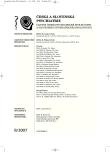-
Medical journals
- Career
The Mechanism of Antidepressants Action on Cellular Membranes
Authors: M. Anders; Z. Fišar
Authors‘ workplace: Psychiatrická klinika 1. LF UK a VFN, Praha přednosta prof. MUDr. J. Raboch, DrSc.
Published in: Čes. a slov. Psychiat., 103, 2007, No. 8, pp. 413-419.
Category: Comprehensive Reports
Overview
The mechanisms of antidepressants action that are linked to their therapeutic effects are not sufficiently explained. According to the membrane hypothesis of affective disorders, disturbances in lipid-protein interactions can be predisposing factor in depression and changes in lipid-protein interactions induced by antidepressive drugs can be crucial step in molecular mechanism of their action. The hypothesis is based on well known fact that lipidprotein interactions affect functionality of most membrane integral proteins, including enzymes, receptors, transporters and ion channels ensuring signal transduction. An isolated synapses, blood elements, cell cultures, isolated plasma membranes and artificial phospholipid membranes can be used as proper models.
Key words:
membranes, neurotransmitters, transporters, antidepressants, synaptosomes.
Labels
Addictology Paediatric psychiatry Psychiatry
Article was published inCzech and Slovak Psychiatry

2007 Issue 8-
All articles in this issue
- May the Images of Slim Female Figures Contribute to the Development of Eating Disorders?
- MEMBRANES IV: Specific Properties of Cell Membrane in Relation to Neuropsychic Disorders
- Membranes: Etiopathogenic Substrate of Depressive Disorders
- The Mechanism of Antidepressants Action on Cellular Membranes
- The Functions of Omega-3 and Omega-6 at Polynusaturatted Fatty Acids on Psychic Disorders
- Czech and Slovak Psychiatry
- Journal archive
- Current issue
- Online only
- About the journal
Most read in this issue- The Functions of Omega-3 and Omega-6 at Polynusaturatted Fatty Acids on Psychic Disorders
- May the Images of Slim Female Figures Contribute to the Development of Eating Disorders?
- MEMBRANES IV: Specific Properties of Cell Membrane in Relation to Neuropsychic Disorders
- The Mechanism of Antidepressants Action on Cellular Membranes
Login#ADS_BOTTOM_SCRIPTS#Forgotten passwordEnter the email address that you registered with. We will send you instructions on how to set a new password.
- Career

